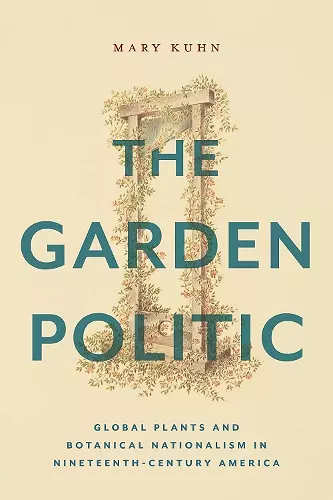The Garden Politic
Global Plants and Botanical Nationalism in Nineteenth-Century America
Format:Paperback
Publisher:New York University Press
Published:7th Feb '23
Currently unavailable, and unfortunately no date known when it will be back

How worldwide plant circulation and new botanical ideas enabled Americans to radically re-envision politics and society
The Garden Politic argues that botanical practices and discourses helped nineteenth-century Americans engage pressing questions of race, gender, settler colonialism, and liberal subjectivity. In the early republic, ideas of biotic distinctiveness helped fuel narratives of American exceptionalism. By the nineteenth century, however, these ideas and narratives were unsettled by the unprecedented scale at which the United States and European empires prospected for valuable plants and exchanged them across the globe. Drawing on ecocriticism, New Materialism, environmental history, and the history of science—and crossing disciplinary and national boundaries—The Garden Politic shows how new ideas about cultivation and plant life could be mobilized to divergent political and social ends.
Reading the work of influential nineteenth-century authors from a botanical perspective, Mary Kuhn recovers how domestic political issues were entangled with the global circulation and science of plants. The diversity of Harriet Beecher Stowe's own gardens contributed to the evolution of her racial politics and abolitionist strategies. Nathaniel Hawthorne's struggles in his garden inspired him to write stories in which plants defy human efforts to impose order. Radical scientific ideas about plant intelligence and sociality prompted Emily Dickinson to imagine a human polity that embraces kinship with the natural world. Yet other writers, including Frederick Douglass, cautioned that the most prominent political context for plants remained plantation slavery.
The Garden Politic reveals how the nineteenth century's extractive political economy of plants contains both the roots of our contemporary environmental crisis and the seeds of alternative political visions.
"A superb contribution to American studies and more importantly, significantly advances and historicizes the material turn in the environmental humanities. Meticulously researched and elegantly written, The Garden Politic offers and indispensable genealogy of race, settler colonialism, and the materiality of an always-contested vision of nature." (Stephanie Foote, West Virginia University) "Presents an original and carefully historicized account of influential nineteenth-century authors' generative engagements with the transnational circulation of plants, from seed exchanges and horticultural periodicals to botanical textbooks. Kuhn makes a compelling case for rethinking familiar forms like sentimentalism, domestic fiction, and abolitionist literature through the interpretive frameworks of botanical science and critical plant studies." (Hsuan Hsu, author of The Smell of Risk: Environmental Disparities and Olfactory Aesthetics) "Kuhn's elegantly crafted arguments represent a valuable addition to the burgeoning discipline of environmental humanities and aligns with the field of ecocriticism. It also reminds readers of the importance of imagination—works crafted within the humanities, and not just science or politics—to tackle the myriad global environmental challenges we face today." (E. G. Harrington, Universities at Shady Grove) "The Garden Politic enables readers to reconsider well-known Dickinson poems and encourages a deep dive into new materialism, plants, and our connection to the natural environment." (Dickinson and the Arts) "In The Garden Politic, out from NYU Press, Mary Kuhn views politics through the lens of 19th-century thinkers-cum-amateur gardeners including Emily Dickinson and Fredrick Douglass." (Vanity Fair) "Kuhn's elegantly crafted arguments represent a valuable addition to the burgeoning discipline of environmental humanities and aligns with the field of ecocriticism. It also reminds readers of the importance of imagination—works crafted within the humanities, and not just science or politics—to tackle the myriad global environmental challenges we face today." - E. G. Harrington (CHOICE)
ISBN: 9781479820153
Dimensions: unknown
Weight: 386g
272 pages